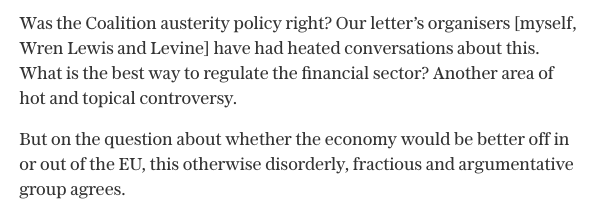Firstly, I wanted to provide some warranted coverage of a letter cosigned by 280 economists (at the time of writing) on the economic impact of Brexit. Here is the text of the letter:
Focusing entirely on the economics, we consider that it would be a major mistake for the UK to leave the European Union.Leaving would entail significant long-term costs.
The size of these costs would depend on the amount of control the UK chooses to exercise over such matters as free movement of labour, and the associated penalty it would pay in terms of access to the single market. The numbers calculated by the LSE’s Centre for Economic Performance, the OECD and the Treasury describe a plausible range for the scale of these costs.
The uncertainty over precisely what kind of relationship the UK would find itself in with the EU and the rest of the world would also weigh heavily for many years. In addition, there is a sizeable risk of a short-term shock to confidence if we were to see a Leave vote on June 23rd. The Bank of England has signalled this concern clearly, and we share it.
Although I don't feel sufficiently familiar with the studies mentioned to add my own name, I respect and admire those who have done so. This is a serious and authoritative statement that is helpful to voters who want to understand the economic arguments (although I'm not sure we can ever focus "only" on the economics without having a very narrow, technical and unhelpful definition of what constitutes economics).
Recently The Telegraph published an article by Tony Yates, one of the organisers of the letter. Unfortunately, I think the article gives a misleading account of the scale of consensus amongst the economics profession.
When I raised this on Twitter Tony said that I'd misunderstood the article, which was split into two parts. The first part was about whether economists should be listened to generally; the second on the specific issue raised by the letter. But I was confused. If the main point was "there isn't a lot that economists agree upon so when they do, it's worth paying attention" I'd be in full agreement. But if this were the case, he'd have identified the range of issues where the cosigners disagree. Instead, Tony says they differ on a somewhat vague "Was the Coalition austerity policy right?", but previously in the article he says that:
Compare the Great Depression to the financial crisis. In the US, output fell by 30pc to its trough. Following 2008, it fell by 4pc. A lot of factors are at work here. But part of it was about lessons we have learnt in macroeconomics.
For example, we understand better why a fiscal stimulus works and when it’s beneficial. The support for this in the economics community helped bring about the US fiscal stimulus package of 2009.
It isn't clear to me whether Tony is saying that (i) there are some topics where economists have a consensus, and can therefore give good policy advice (and fiscal stimulus and the economics of Brexit are two of those areas); or (ii) disagreements between the cosigners on fiscal stimulus is all the more reason to take seriously their agreement on Brexit. Who were the cosigners who believed that the US fiscal stimulus backfired? Which ones thought UK austerity was a myth and cuts should have been deeper? Also, if he wanted to pick a topic on which there was genuinely a consensus among the profession then why didn't he choose free trade? Indeed that would be much more relevent in the context of a vote to leave a free trade area.
Furthermore, whether he's using "we" to refer to economists, or the cosigners, isn't helped by The Telegraph's editing team. Consider the final paragraph:

It is very clear that the "disorderly, fractious and argumentative" group that Tony is referring to is the cosigners of the letter. Indeed this is also clear from the URL of the article:

However the headline conveniently drops the word "these":

The headline reads as if Tony is referring to all economists. In fact, he's claiming that he's only referring to a group of 280. I've written plenty of op eds and am used to editors using a slightly misleading headline in order to generate a response. But usually I'd say "I didn't write the headline!" I don't think Tony wrote the headline, but I'm surprised that he's not willing to distance himself from it. If 280 economists agree on something policy relevent then it is worth reporting. But if it's reported in a way that implies consensus within the entire profession, this actually reduces the quality of public debate.